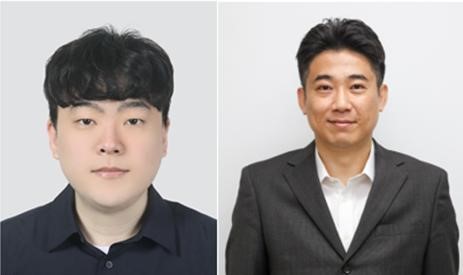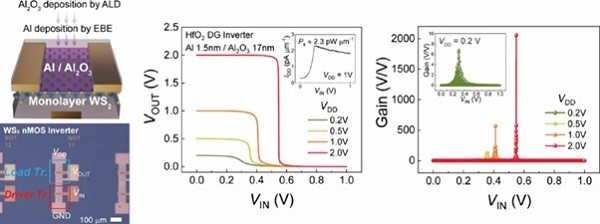Development progress on Field-Effect Transistors and Logic Circuits.
- admin
- 2024-09-06
- 1571
· Prof. Taejoon Ha's Research Team (Department of Electronic Materials Engineering) Using Aluminum Oxide Doping and a Dual-Gate Structure
Develop a Field-Effect Transistor
and Logic Circuits Based on a Monolayer of Tungsten Disulfide
- Published in ACS Nano, a top-tier
international journal in the field of materials science (IF: 17.1, JIF ranking:
94.3%) -

(Left) Sangjun Park, PhD Integrated Program,
and Prof. Taejoon Ha
Prof. Taejoon Ha’s research team from
Kwangwoon University‘s Department of Electronic Materials Engineering, in
collaboration with Prof. Junyoung Kwak’s team from Ewha Womans University and
Prof. Jiwon Jang’s team from Yonsei University, successfully developed a
field-effect transistor with a low subthreshold swing and high voltage gain.
This was achieved using a monolayer of tungsten disulfide (WS₂) grown by chemical vapor deposition as
the channel layer, combined with aluminum oxide doping and a dual-gate
structure based on hafnium oxide. They also successfully implemented logic
circuits. The results of this study were published
in ACS Nano (IF: 17.1, JIF ranking: 94.3%), a top-tier international journal in
the field of materials science, under the title 'Realization of Extremely
High-Gain and Low-Power in nMOS Inverter Based on Monolayer WS₂ Transistor Operating in Subthreshold
Regime,' published by the American Chemical Society.
Recently, two-dimensional transition metal
dichalcogenide materials, which are much thinner than conventional silicon,
have been receiving significant attention as channel layers for scaling
field-effect transistors. However, due to their thinness, they
suffer from high gate leakage current during operation and poor gate
controllability caused by charge scattering effects. In response, Prof. Taejoon Ha’s research team from the Department of
Electronic Materials Engineering, in collaboration with Prof. Junyoung Kwak’s team from Ewha Womans University and
Prof. Jiwon Jang’s team
from Yonsei University, developed a WS₂ field-effect transistor with a low
subthreshold swing and high voltage gain using aluminum oxide doping and a
dual-gate structure based on hafnium oxide. They successfully implemented an
inverter using this approach. The fabricated WS₂ field-effect transistor exhibited a high
on/off ratio of approximately 10¹? and a low subthreshold swing of 88 mV/dec. Additionally, based on this, they
successfully implemented an NMOS inverter logic circuit with a high voltage
gain of up to 2056 and extremely low power consumption of approximately 2.3
pWm-1.
Meanwhile, this research was conducted as
part of the University Innovation Future Challenge Project, with collaborative
efforts from the Interactive Display Research Center, led by Prof. Taejoon Ha
as the director. It was also supported by the university’s internal academic research funding
program at Kwangwoon University. Prof. Taejoon Ha's research team
is conducting extensive research not only on the design of next-generation
electronic devices based on advanced materials but also on process development.
Their work, focused on next-generation semiconductors such as carbon nanotubes,
graphene, and two-dimensional transition metal dichalcogenides, has resulted in
the publication of over 60 SCI journal articles and the filing of more than 30
international and domestic patents.

WS₂ Field-Effect Transistors Doped with Aluminum Oxide and Analysis of Their Application in Inverters